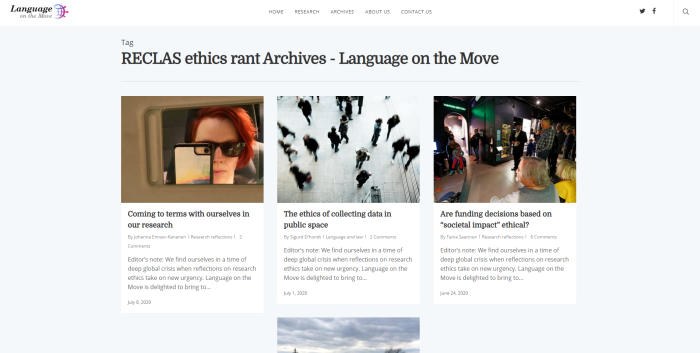Ethics Rant blog texts offer fresh views on language and research ethics
If these topics are of interest to you, you should read the thorough blog posts from Language on the Move website. Under the header “Reclas Ethics rants”, four Language Campus scholars wrote about ethics in research work during last summer.
”Do concepts and methods have ethics?”, Petteri Laihonen asks in his text. He has done studies with minority language speakers and ponders what impact does the researcher’s own role have, when they are conducting interviews. Laihonen argues that ideally, research should also benefit the communities that participate in the studies.
“There is a mismatch between the long-term activities (or “impact”) of universities and their short-term strategic decision-making”, Taina Saarinen writes in the second blog post.
Her text examines the topical issue of the relationship between research funding and societal impact. Societal impact is a central objective of higher education, but funding research based on impact emphasizes short-term political goals to the detriment of long-term benefits. You can read the text “Are funding decisions based on “societal impact” ethical?” behind the link.
Sigurd D’hondt dives into the consequences of EU’s GDPR regulation for researchers. He focuses on ethnographic research and publicly available data. The regulations challenge the work of researchers and cause a real chilling effect. “At this stage, it would be perilous for applied linguists and ethnographers to assume a quietist stance”, D’hondt writes. Read the full text “The ethics of collecting data in public space”.
Johanna Ennser-Kananen analyses the researcher’s position and how that affects research ethics. The writing ”Coming to terms with ourselves in our research” shows how numerous things in our identities and worldviews as researchers shape the work we do.
”We all make decisions, act in particular social contexts, and are shaped by what we know, believe, and strive for”, Ennser-Kananen notes.
This positionality might often be camouflaged under “the cloak of objectivity” of scientists. Researchers should be aware of their own choices, and for example on the matter of which social groups they are a part of (and which they are not).

This brief overview of the rants only scratches the surface. Therefore, you should head to the Language on the Move website to read the texts in full!
Language on the Move is a research website devoted to sociolinguistics, multilingualism, language learning and intercultural communication. It is edited by Ingrid Piller. The writers of these four texts were members in the University’s RECLAS profiling area, that ended recently. If you are interested in similar topics, you should also see the more recent profiling area MultiLEAP.
Text: Pasi Ikonen
Image: MONT, Unsplash
